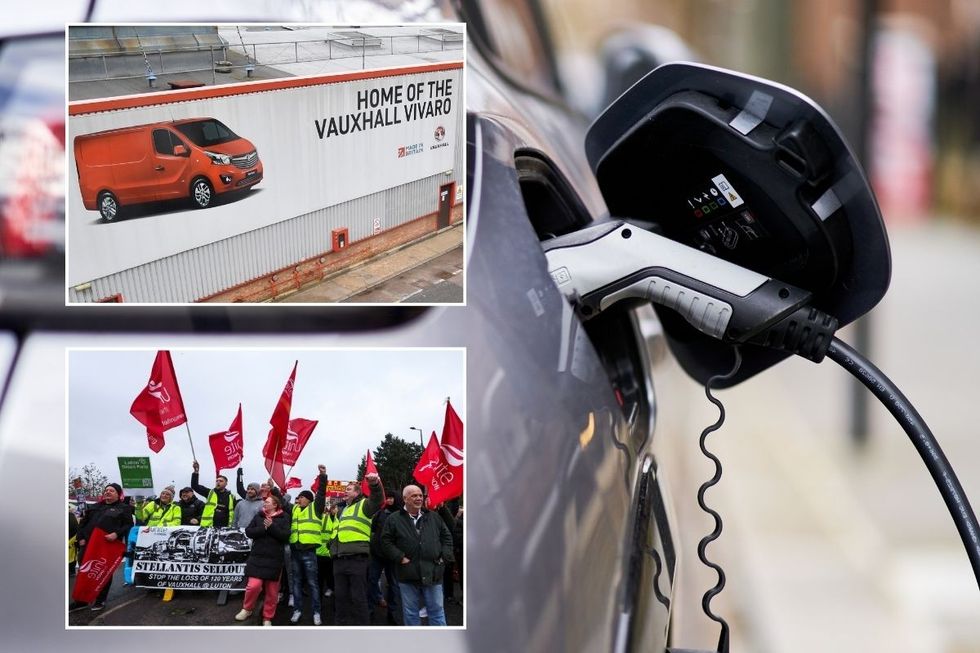UK to meet electric vehicle mandate rules despite being blamed for job losses at Vauxhall’s Luton plant
The UK car industry is set to meet the Government’s electric vehicle sales mandate for 2024, despite frequent complaints from some manufacturers about its stringent requirements.
According to new analysis from the Energy and Climate Intelligence Unit (ECIU), major brands are on track to achieve the required 22 per cent target through a combination of fully electric vehicle sales and credits earned from lower-emission hybrid vehicles.
The Zero Emission Vehicle (ZEV) mandate requires each manufacturer to meet specific zero-emission vehicle targets, with penalties of £15,000 per polluting car sold above the limits for those who fail to comply.
The ECIU’s analysis shows fully electric vehicles are expected to achieve approximately 19 per cent market share this year.
Do you have a story you’d like to share? Get in touch by emailing motoring@gbnews.uk

An additional three per cent will come from credits earned through the sale of lower-emission hybrid petrol and diesel vehicles.
This combined total of 22 per cent aligns perfectly with the government’s Zero-emission vehicle mandate target for manufacturers.
The targets are set to increase progressively in coming years, rising to 28 per cent in 2025 and 80 per cent by the end of the decade.
Manufacturers have flexibility options available, including purchasing credits from rival companies or adjusting future sales to meet requirements.
The Society of Motor Manufacturers and Traders (SMMT) has called for additional flexibilities to help carmakers meet “the challenging target set this year”.
The Government is now developing a consultation on relaxing the mandate’s rules following pressure from the automotive sector.
Colin Walker, head of transport at the ECIU, defended the rules, saying: “The mandate is having the desired effect of driving down costs and driving up sales, enabling more families to get behind the wheel of cleaner, cheaper-to-run cars.
“Some manufacturers have been slow to wake up to the global shift towards EVs and are being left behind, but many – including BMW, Mercedes and Hyundai – are ahead of the mandate targets.”
Walker warned against weakening the mandate, suggesting it would “risk putting the UK car industry in the slow lane” and could stall billions in charging infrastructure investment.
The impact of these regulations was highlighted when Vauxhall owner Stellantis announced the closure of its Luton van-making factory in November, putting 1,100 jobs at risk.
Stellantis specifically cited the “stringent” zero-emission vehicle mandate as part of the context for this decision.
Similarly, Ginny Buckley, chief executive of Electrifying.com, emphasised the mandate’s importance in providing clear direction for manufacturers.
LATEST DEVELOPMENTS:
- Honda and Nissan unveil major plans to merge amid ‘dramatic changes’ despite ‘panic mode’ fears
- Local authority receives praise for returning hundreds of roads back to 30mph – ‘Making progress’
- Motorists risk having vehicles seized ‘immediately’ by police amid new crackdown rules

She added: “The ZEV mandate ensures that the car industry shifts away from fossil fuels, providing it with a clear direction and timeline to work from, allowing manufacturers to plan production, streamline supply chains, and invest in new technology effectively.”
A Department for Transport spokesperson expressed confidence in the mandate’s success, saying drivers switching to electric vehicles would benefit from “cheaper motoring, lower emissions” while helping drive growth and jobs.
It added that the Government is investing £2.3 billion to boost electric vehicle adoption across the UK.

